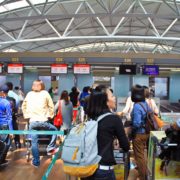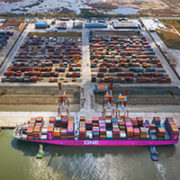Tag Archives | Jayant Menon
Economics, Governance and public sector management, Health
 Economics, Health, Regional cooperation and integration
Economics, Health, Regional cooperation and integration
 Economics, Health, Social development and protection
Economics, Health, Social development and protection
 Economics, Industry and trade, Regional cooperation and integration
Economics, Industry and trade, Regional cooperation and integration
 Governance and public sector management
Governance and public sector management
 Governance and public sector management, Private sector development
Governance and public sector management, Private sector development

Can closing borders shut out new COVID-19 strains?

In fighting the coronavirus disease (COVID-19) pandemic and, in particular, the new strains that are emerging, many countries have adopted the dual approach of closing borders and increasing domestic surveillance. This might be overkill. In fact, the latter might suffice.
Toward an ASEAN COVID-19 travel balloon

While financial markets have responded strongly to the emergency-use authorization of various coronavirus disease (COVID-19) vaccines in several countries, the economic impacts will take much longer to materialize. One reason for this is that vaccinating 60% or more of populations to achieve herd immunity will take time. Reaching herd immunity is critical given the possibility that those vaccinated may still be infectious, despite being immune to the disease.
How should ASEAN and ASEAN+3 respond to the COVID-19 crisis?

The Association of Southeast Asian Nations (ASEAN) and its bigger counterpart ASEAN+3, comprising the 10 ASEAN members and the People’s Republic of China, Japan, and the Republic of Korea (ROK), have been slow to respond to the COVID-19 pandemic. While they have been strenuously ramping up their efforts, more needs to be done, and quickly. There are many things they can do immediately, such as employing their machinery to increase consultation and cooperation to curb contagion—both medical and economic—and limit beggar-thy-neighbor policies.
The upgraded ASEAN-People’s Republic of China Free Trade Agreement could matter, big time

In 2015, the Association of Southeast Asian Nations (ASEAN) and the People’s Republic of China (PRC) signed an Upgrade Protocol to improve the original Framework Agreement for the ASEAN-People’s Republic of China Free Trade Area (ACFTA) as well as their Agreement on Trade in Goods, Services, and Investment. The Upgrade Protocol entered into force in July 2016, and implementation will start from August 2019.
Malaysia’s affirmative action should be based on need

When Malaysians came out in numbers to replace the government that had ruled since Independence, they signaled a clear desire for change. But what kind of mandate does the new government have? Pakatan Harapan’s election campaign included a host of promises, most of which are now being pursued without much controversy.
“Monsters” in the house? What to do about Malaysia’s government-linked companies

About a month before Malaysia’s parliamentary election in May 2018, then-opposition leader Mahathir Mohamad raised concerns over the role that government-linked companies (GLCs) were playing in the economy, being “huge and rich” enough to be considered “monsters”. Data support his description—GLCs account for about half of the benchmark Kuala Lumpur Composite Index, and they constitute seven out of the top-10 listed firms in 2018. They are present in almost every sector, sometimes in a towering way. Globally, Malaysia ranks fifth-highest in terms of GLC influence on the economy.


Search
Subscribe / Connect to Asia Pathways
Subjects
- Agriculture and natural resources
- Blog
- Capacity development
- Climate change
- Economics
- Education
- Energy
- Environment
- Finance sector development
- Gender
- Governance and public sector management
- Health
- Industry and trade
- Information and Communications Technology
- Infrastructure
- Miscellaneous
- Population
- Poverty
- Private sector development
- Regional cooperation and integration
- Sanitation
- Social development and protection
- Transport
- Uncategorized
- Urban development
- Video Blog
- Water
Recent Posts
- Unraveling the Health Risks of Climate Change
- Linking Farmers to Markets Through Agricultural Cooperatives and E-Commerce in Asia
- How Can Governments Support Electricity Distribution to Achieve Net Zero in Asia?
- Promoting Corporate Climate Action Through Greenhouse Gas Accounting
- Evaluating G7 Commitments on Climate Change, Health, Well-Being, and Agriculture




Recent Comments